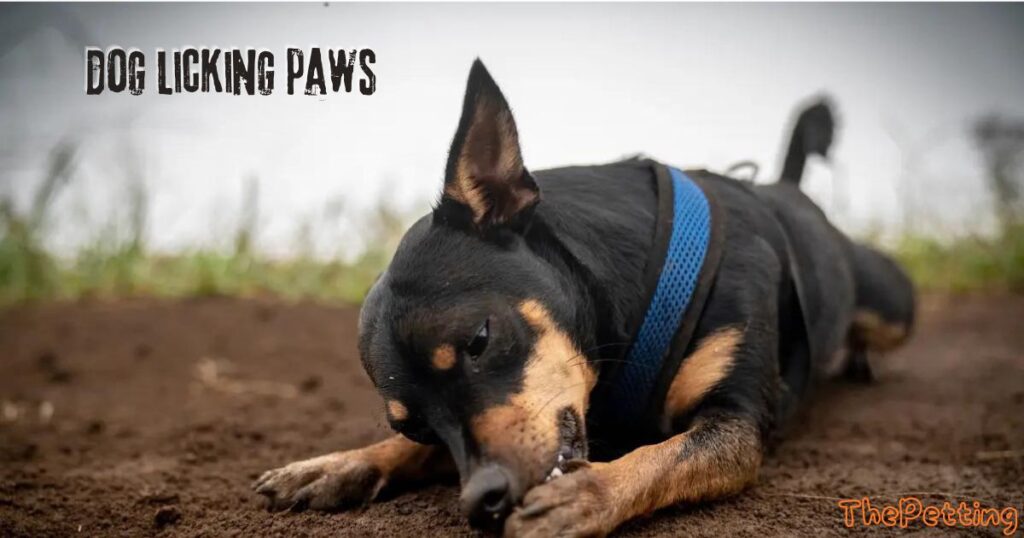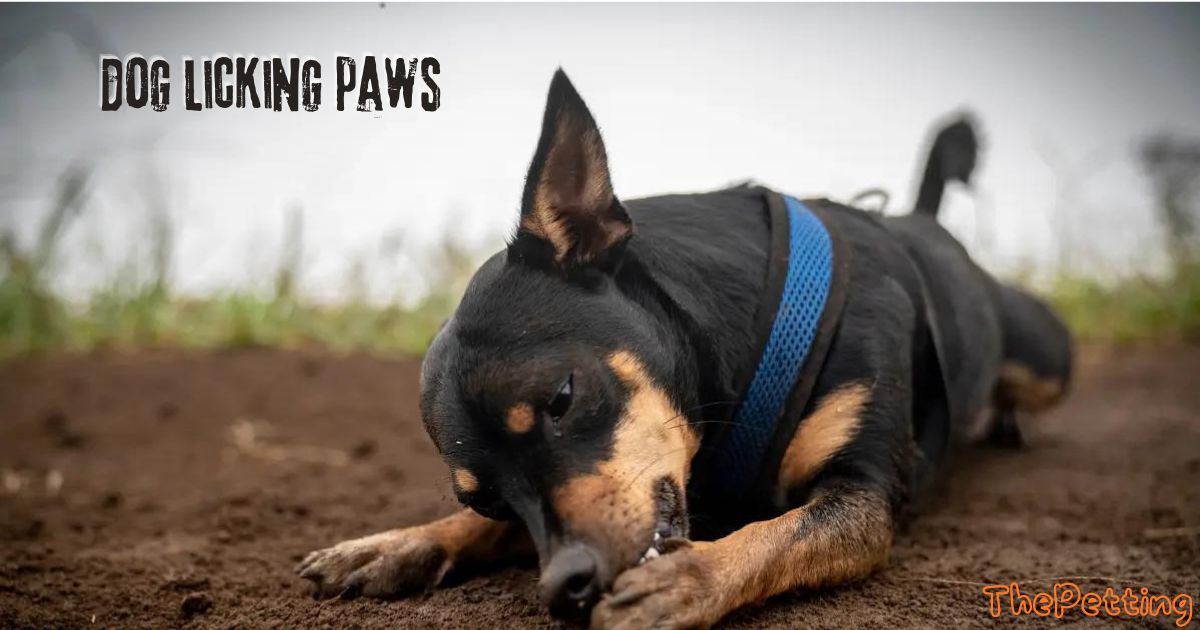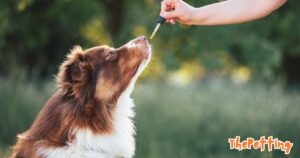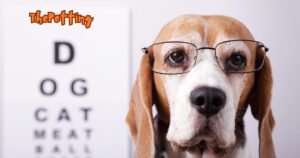Introduction
Have you noticed your dog frequently licking its paws? While it might seem like an innocent quirk, excessive dog licking paws can indicate underlying issues that need attention. Whether it’s a sign of discomfort, an allergy, or even anxiety, understanding the reasons behind this behavior is essential for your dog’s well-being. In this article, we’ll delve into the common causes of paw licking, how to recognize when it’s a problem, and what you can do to help your furry friend.

Why Do Dogs Lick Their Paws?
Dogs often lick their paws as part of their grooming routine, but when the licking becomes excessive, it’s usually a sign that something is wrong. Here are some of the most common reasons why dogs lick their paws:
1. Allergies
One of the leading causes of paw licking is allergies. Dogs can suffer from environmental allergies, such as pollen, grass, and mold, or food allergies. When a dog’s immune system reacts to these allergens, it can cause itching and inflammation, particularly in the paws.
How to Identify Allergies
- Seasonal Patterns: If the licking worsens during specific seasons, environmental allergens could be the culprit.
- Redness and Swelling: Check for any redness, swelling, or rashes around the paws.
- Other Symptoms: Excessive scratching, ear infections, or gastrointestinal issues may also indicate allergies.
2. Infections
Bacterial or fungal infections, particularly between the toes, can cause intense itching and discomfort, leading to persistent paw licking. These infections often occur when a dog’s paws are constantly wet or dirty.
Signs of Infection
- Discoloration: Look for brown or red stains on the paws.
- Odor: A foul smell can indicate a yeast or bacterial infection.
- Discharge: Pus or other discharges are common signs of infection.
3. Injuries
Dogs may lick their paws to soothe an injury. This could be anything from a small cut or scrape to a more serious issue like a fractured toe or a foreign object lodged in the paw.
Recognizing Injuries
- Limping: Your dog may favor one paw over another.
- Swelling: Swollen areas might indicate a sprain or fracture.
- Visible Wounds: Inspect the paw for cuts, splinters, or nails caught in the pads.
4. Anxiety or Behavioral Issues
Just like humans, dogs can develop habits in response to stress or anxiety. Paw licking can become a compulsive behavior, often linked to separation anxiety or boredom.
Behavioral Indicators
- Excessive Licking: Licking occurs even when there’s no visible cause.
- Other Anxiety Symptoms: Look for signs like whining, barking, or destructive behavior.
- Triggers: Identify any changes in the environment or routine that may have caused the anxiety.
5. Parasites
Fleas, ticks, and mites can cause severe itching and irritation, leading to constant paw licking. Flea allergy dermatitis is a common condition where a dog is allergic to flea saliva, causing intense itching.
Detecting Parasites
- Flea Dirt: Look for small black specks in your dog’s fur.
- Hair Loss: Bald patches could indicate a parasitic infestation.
- Constant Scratching: Especially around the paws, neck, and tail base.
When to Worry: Signs That Paw Licking Is a Problem
While occasional paw licking is normal, you should be concerned if:
- Licking is Continuous: When your dog can’t seem to stop licking, even when distracted.
- Paws Are Red or Swollen: Signs of inflammation or infection should prompt a visit to the vet.
- Hair Loss or Skin Changes: Bald spots or changes in the skin’s appearance are red flags.
- Behavioral Changes: If your dog seems more anxious or irritable, it might be related to the discomfort in their paws.
How to Stop Dog from Licking Paws: Home Remedies
If you’ve identified the cause of your dog’s paw licking, you can try these home remedies to provide relief:
1. Epsom Salt Soak
Epsom salt has anti-inflammatory properties that can soothe irritated paws. Mix warm water with Epsom salts and let your dog’s paws soak for 5-10 minutes.
2. Coconut Oil
Coconut oil is a natural moisturizer with antibacterial properties. Massaging a small amount into your dog’s paws can help soothe and heal dry, cracked skin.
3. Apple Cider Vinegar Spray
Dilute apple cider vinegar with water (1:1 ratio) and spray it onto your dog’s paws. This solution can help with fungal infections and also deter licking due to its strong taste.
4. Aloe Vera Gel
Aloe vera is known for its soothing and healing properties. Apply a small amount of pure aloe vera gel to the affected area to reduce inflammation and promote healing.
5. Dietary Changes
If food allergies are suspected, consider switching to a hypoallergenic diet. Consult with your vet to determine the best diet plan for your dog.
If your dog’s paw licking is more than just a harmless habit, a simple home remedy like soaking their paws in an Epsom salt bath could help reduce irritation. However, identifying the underlying cause is crucial for long-term relief. Read on to discover the true reasons behind this behavior and how you can address it effectively.
Prevention Tips: Keeping Your Dog’s Paws Healthy
Preventing paw licking is often easier than treating it. Here are some tips to keep your dog’s paws healthy:
- Regular Grooming: Trim your dog’s nails and fur around the paws to prevent dirt and debris from getting trapped.
- Paw Checks: Regularly inspect your dog’s paws for cuts, foreign objects, or signs of infection.
- Keep Paws Dry: After walks or baths, ensure your dog’s paws are thoroughly dried to prevent infections.
- Use Protective Booties: During harsh weather conditions, consider using dog booties to protect their paws from extreme heat, cold, or rough terrain.
- Maintain a Clean Environment: Regularly clean your dog’s bedding and living areas to reduce exposure to allergens and parasites.
When to See a Vet
If home remedies don’t seem to alleviate your dog’s paw licking or if the condition worsens, it’s essential to consult a veterinarian. Persistent licking can lead to secondary infections or indicate a more serious underlying condition that requires professional treatment.
A veterinarian may recommend:
- Medications: Antihistamines, antibiotics, or anti-inflammatory drugs.
- Allergy Testing: To identify specific allergens causing the issue.
- Behavioral Therapy: For dogs whose licking is related to anxiety or stress.
Conclusion
While it might seem like a harmless habit, excessive paw licking can signal underlying health issues in your dog. By understanding the causes and implementing appropriate home remedies and preventive measures, you can help your dog lead a comfortable and healthy life. Always consult your vet if you’re unsure about the severity of your dog’s condition or if home treatments aren’t effective. Remember, your dog relies on you to notice when something isn’t right—so don’t ignore the signs. Whether it’s a simple irritation or a more complex issue, early intervention is key to ensuring your pet’s paws stay healthy and happy.
For more detailed information on dog allergies and treatments, you can visit AKC’s Guide on Canine Allergies.








